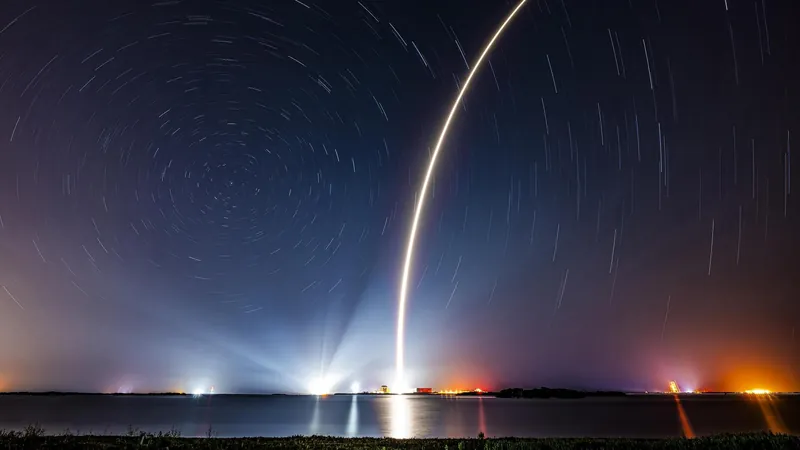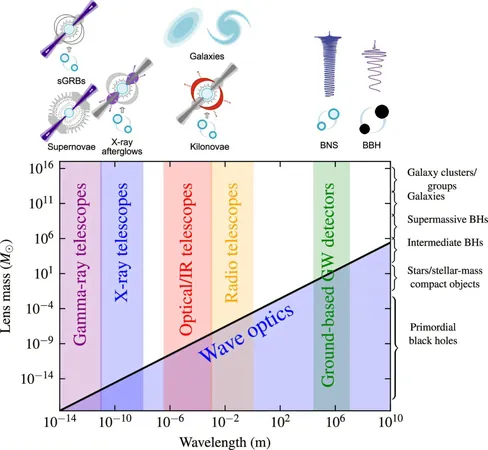
SpaceX Hits Milestone with 250th Starlink Launch as Amazon's Network Delays
2025-04-28
Author: William
In an extraordinary display of orbital prowess, SpaceX has successfully completed its 250th Starlink mission! Just eight minutes post-launch, the Falcon 9 rocket's first stage made a flawless vertical landing on its drone ship, "Just Read the Instructions," stationed in the Atlantic Ocean.
This milestone marks the Falcon 9’s 20th flight with 13 dedicated to Starlink missions. The rocket’s upper stage deployed a remarkable 23 satellites into low Earth orbit (LEO) about an hour after liftoff.
This recent launch not only represents the 48th Falcon 9 flight of 2025 but also the 31st aimed at bolstering the ever-expanding Starlink megaconstellation, which now boasts over 7,200 operational satellites—part of an impressive total of around 8,400 satellites launched across these 250 missions over nearly six years.
Astrophysicist Jonathan McDowell highlights that SpaceX's agile mission strategy and cost-saving techniques, such as reusing boosters and rocket fairings, have significantly accelerated the pace of satellite deployments.
Today, Starlink provides high-speed broadband internet to over five million customers worldwide and has plans to launch 12,000 satellites, with regulatory approval for a potential total of 34,400 satellites.
But it's not all smooth sailing in the satellite internet arena. Amazon's Project Kuiper, intended to rival Starlink, faced delays that pushed its inaugural satellite launch—set for today atop a United Launch Alliance (ULA) Atlas V rocket—to 7:00 PM EDT (4:30 AM IST, April 29) from Cape Canaveral Space Force Station.
Dubbed Kuiper 1, this launch is the first of 83 planned for Project Kuiper, which aims to deploy over 3,200 satellites for high-speed internet access. Although Amazon had previously launched two prototype satellites to set the stage for this mission, it has faced various setbacks, including weather-related delays and scheduling conflicts.
While Kuiper 1 will make its debut aboard the Atlas V, future satellites are expected to launch on an array of rockets, including Arianespace's Ariane 6, ULA’s Vulcan Centaur, and Blue Origin’s New Glenn. As the race for satellite internet escalates, all eyes are now on both SpaceX’s monumental successes and Amazon’s quest to secure its place in space.









 Brasil (PT)
Brasil (PT)
 Canada (EN)
Canada (EN)
 Chile (ES)
Chile (ES)
 Česko (CS)
Česko (CS)
 대한민국 (KO)
대한민국 (KO)
 España (ES)
España (ES)
 France (FR)
France (FR)
 Hong Kong (EN)
Hong Kong (EN)
 Italia (IT)
Italia (IT)
 日本 (JA)
日本 (JA)
 Magyarország (HU)
Magyarország (HU)
 Norge (NO)
Norge (NO)
 Polska (PL)
Polska (PL)
 Schweiz (DE)
Schweiz (DE)
 Singapore (EN)
Singapore (EN)
 Sverige (SV)
Sverige (SV)
 Suomi (FI)
Suomi (FI)
 Türkiye (TR)
Türkiye (TR)
 الإمارات العربية المتحدة (AR)
الإمارات العربية المتحدة (AR)